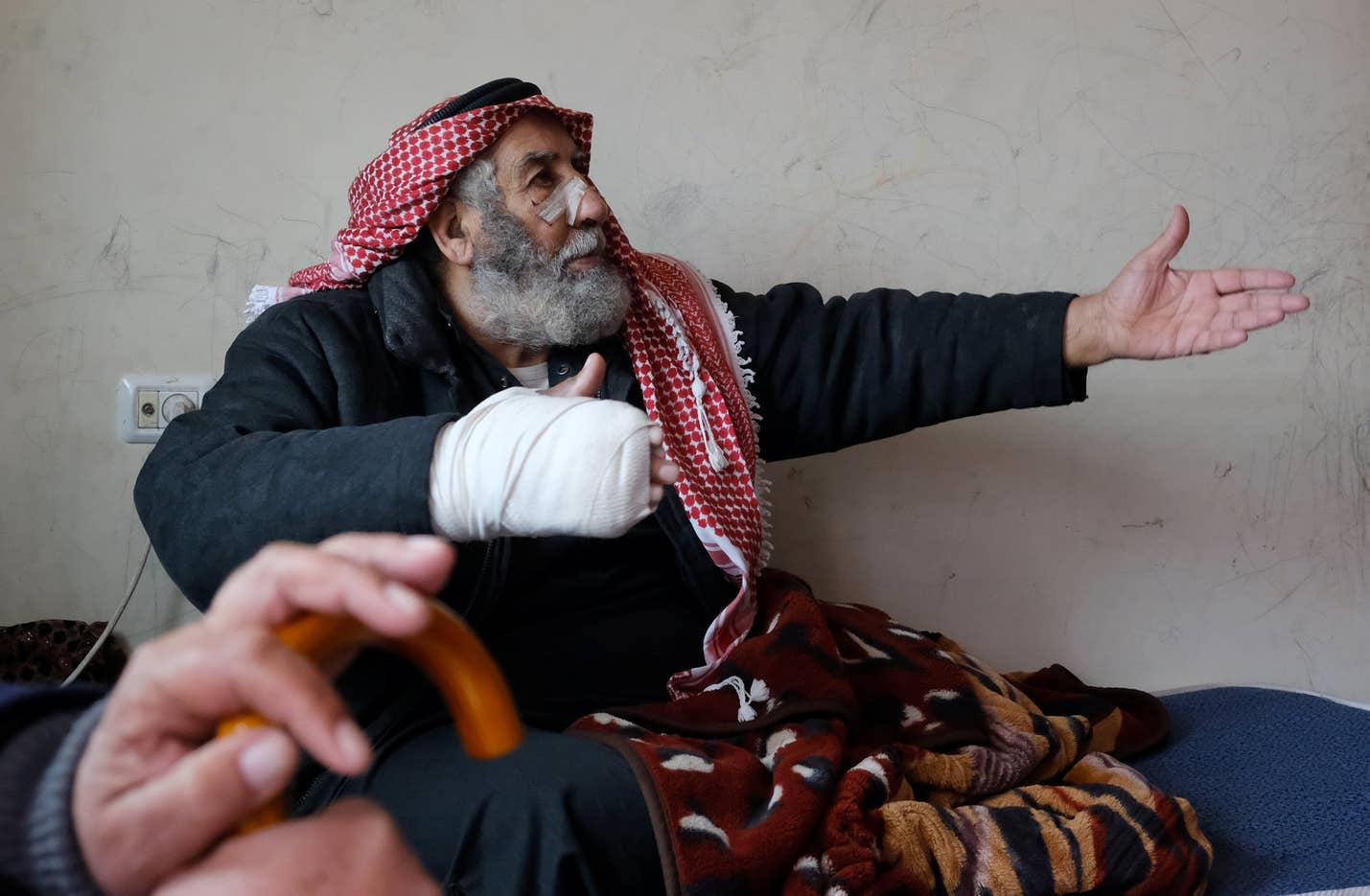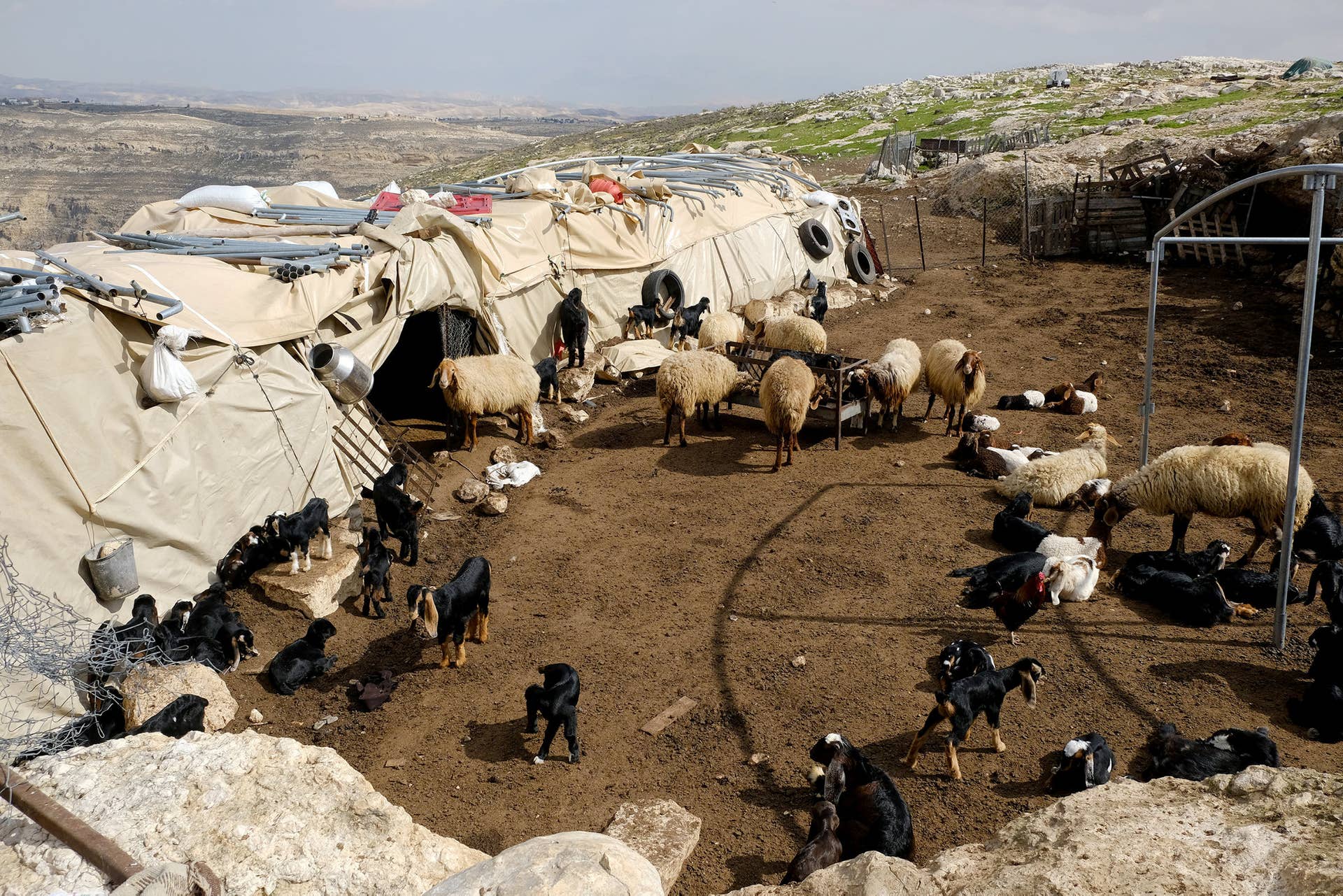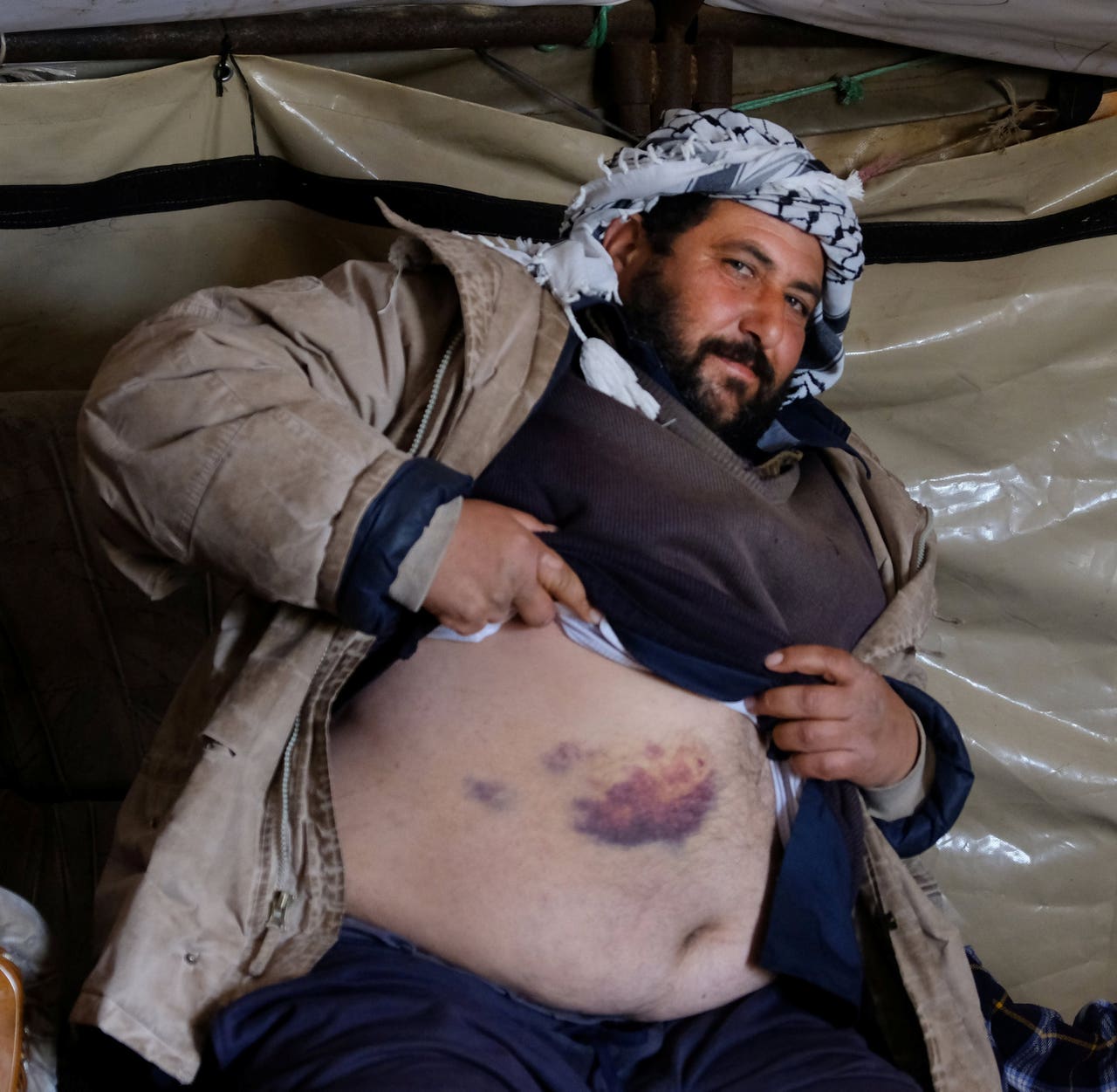The Klan on Mt. Qanub: Armed With Axes and Clubs, Settlers Attack a 73-year-old Palestinian
 Saturday, February 19, 2022 at 12:51PM
Saturday, February 19, 2022 at 12:51PM Dozens of settlers swoop down on a pastoral shepherding community on the dark edge of the Judean Desert
by Gideon Levy. 18. February 2022 Haaretz
 Mohammed Shalalda, this week. The settlers kept pounding him, on his face, head, all over. He estimates that the assault lasted 10 minutes. No one was able to help him.Credit: Alex Levac
Mohammed Shalalda, this week. The settlers kept pounding him, on his face, head, all over. He estimates that the assault lasted 10 minutes. No one was able to help him.Credit: Alex Levac
Mohammed Shalalda, a 73-year-old shepherd, is sitting on an old bed in a shabby room in Sa’ir, a town near Hebron. His head and hand are bandaged: Shalalda is recovering from a pogrom. He was hospitalized for five days in Hebron and is now recuperating at the home of one of his sons. When he is well again, he’ll return to his tent-home in his family’s small pastoral enclave, which lies a few kilometers to the east, on Mount Qanub. Shalalda, who has 10 children, was born on that mountain and will probably die there, too.
Last week he thought death was at hand. While being beaten by settlers with rocks and clubs, laying bleeding and helpless on the ground outside his home, he was convinced that his end had come, he told us this week. He started to recite the Koranic verses designated for the last moments in the life of a believer – all the while being punched and pummeled, while two of his sons stood by helplessly, unable to approach. The army arrived at the last minute and his life was spared.
The bare mountain, which was whipped by a cold wind this week, is surrounded almost on all sides by Jewish settlements and settler outposts, some of them violent and wild. This is the threshold of the Judean Desert, east of Bethlehem, the dark eastern side of the Etzion Bloc of settlements – less “enlightened,” “moderate” and American, far from the eyes of everyone, where the settlers can rampage mercilessly.
A cheap synthetic blanket is spread across Shalalda’s large frame; he’s wearing a red keffiyeh. A few elderly Palestinians about his age are sitting around him, one leaning on a cane. Seven families remain in the community of shepherds, dwelling in a place they call Ganub, on the mountain, while seven other families abandoned the site in the past few years, terrified of the settlers. For Shalalda, who owns 200 sheep, this is lambing season, and his pen was filled with newborns when we visited.
 The area where the attack took place on Mount Qanub.Credit: Alex Levac
The area where the attack took place on Mount Qanub.Credit: Alex Levac
A brief history of the ordeals, as pogrom survivor Shalalda relates it: In 1983, two settlers appeared in his tent compound and announced that they intended to take up residence in the area. They spoke to him about good-neighborly relations, adding that they would come to his aid when needed; if he were bitten by a snake, they said, they would help him. Thus Asfar, aka Metzad, was established – a Haredi settlement that began as a Nahal Brigade outpost, housed a gar’in (“core group”) of new immigrants from Western Europe and South Africa, and spawned the nearby outpost of Pnei Kedem 15 years later.
A few months after the promising cordial, neighborly chat, the security coordinator of the new settlement showed up and started to chase the shepherds off their pasture land with his vehicle. The harassment, aimed at taking over their fields and making their lives miserable, went on for some years. The incursions were frequent. During one raid, the tent of an elderly woman who lived alone was set ablaze; by some miracle, she escaped unscathed.
Most of the confrontations in those years occurred at the enclave’s well, which is frequented by the shepherds and their flocks. The settlers would forcefully drive them off. It was a daily occurrence, Shalalda recalls. In one incident, the army intervened and confiscated his buckets. By the late 1980s the situation became somewhat calmer, and quiet prevailed in the area for about 10 years. “When they came to us we made tea for them,” Shalalda relates.
- 'We arrested countless Palestinians for no reason,' says ex-top Shin Bet officer
- When Israeli settlers beat a Palestinian, we are all responsible
On a clear day you can see east to the Dead Sea from here. The settlements of Ma’aleh Amos and Metzad, and beyond them the outposts of Pnei Kedem and Ibei Hanahal, spread across the hills that surround the herders, moved ever closer, choked off the grazing areas. The arrival about three years ago of violent “hilltop youth” augured the renewal of the raids on Shalalda and his sons while they grazed their flocks, on the backdrop of these biblical panoramas. The young settler-upstarts started to attack the shepherds using dogs and all-terrain vehicles; the shepherds have filed many complaints with the police, which as per standard procedure were of no avail. A year ago, for example, one of Shalalda’s sons, Subhi, 34, was injured when he was hit by an all-terrain vehicle driven by a settler; nothing came of the complaint they submitted.
 Mohammed Shalalda's nephew Yaqub. He has several broken fingers in addition to the stomach injury.Credit: Alex Levac
Mohammed Shalalda's nephew Yaqub. He has several broken fingers in addition to the stomach injury.Credit: Alex Levac
Last Tuesday, February 8, saw the most violent incident to date. At about 5 P.M., two vehicles and an ATV carrying settlers approached the tent compound, stopping next to the rusting red Renault Express that lies at the entrance. Around 15 young men emerged, armed with axes and clubs, Shalalda says. The members of his family fled in a panic; he told the women and children to move toward the east. He realized immediately that the settlers had come to attack. His sons Subhi and Walid, 38, who live in the enclave, were several dozen meters away on their way to the pen with their flocks, and could not come to their father’s aid. The scene evoked attacks of the Ku Klux Klan in the United States, as human rights lawyer Michael Sfard described the general settler-violence plaguing Palestinians, in these pages last week.
One of the settlers organized his cohorts in a row and barked orders in Hebrew, which Shalalda doesn’t understand. From a distance of a few meters they began throwing stones at the tents and at the fleeing family members. Then seven of them assaulted the elderly shepherd. He was gripped by terror, left alone to his fate, cut off from his entire household. The settlers struck him with large stones and clubs, he says; he fell on his back next to the decrepit red Renault. They went on pounding him. On his face, head, arms, all over. He estimates that the assault lasted about 10 minutes. No one was able to help him; his sons and a nephew, 45-year-old Yaqub, could see what was going on from a distance but were driven back by the settlers when they tried to approach.
More vehicles arrived. Dozens of additional settlers spilled out, Shalalda says, perhaps 70. Someone from the family apparently called the International Red Cross, asking for help. In the meantime, the settlers turned their rage on Yaqub, heaving a big stone at his stomach. Shalalda was bleeding from the nose, mouth and head. Photographs taken by neighbors show him lying on the ground, without his keffiyeh, blood staining the earth next to him. Now he removes his keffiyeh to show us the cuts and stitches on his head.
After a quarter of an hour, Israeli soldiers arrived, summoned by the Red Cross via the Palestinian and Israeli coordination and liaison authorities. The settlers beat a quick retreat.
A female soldier wearing blue rubber gloves administered first aid to the man who lay on the ground, bleeding. “She was a humane person,” Shalalda says. “If only all the soldiers were like her.” She also hugged him, he adds. His granddaughter, Hanan, 11, who was now able to approach her grandfather, burst into tears. Another son, Fadel, who was summoned from Sa’ir, asked one of the officers why the attack had happened. The officer’s reply, he says, was, “Believe me, I am under their control, too.”
The soldiers summoned an Israeli Magen David Adom ambulance, which took Shalalda to the main road, where he was transferred to a Red Crescent ambulance and taken to Al-Ahli Hospital in Hebron. The wounds on his face and head were stitched, he underwent surgery and remained in the hospital for five days. Three of his fingers were broken. Yaqub was also rushed to the hospital and remained there for one night. He has several broken fingers in addition to the stomach injury.
This week the men filed a complaint at the police station in Betar Ilit, an urban Haredi settlement. But nothing will come of it. Indeed, Haaretz’s Hagar Shezaf reported last week that only 4 percent of the cases of settlers’ nationalist violence against Palestinians result in indictments. The period of 2018-2020 saw 220 such complaints closed with no action taken.
Will he return home?
Shalalda: “When I recover, I will return. I will not leave my sheep and my lands. Even if I were about to die, I would not leave. My last words to you: Tell them that we can live together, if they want. But they don’t want.”
We drove to the tent enclave. Shalalda’s bloodstains are still visible on the ground, next to the junked Renault. In a well-heated tent, Yaqub shows us the big blue bruise on his stomach.
--------------------------------------------------------------------------------------------------------------------------
 APJP |
APJP |  Post a Comment |
Post a Comment |
Reader Comments